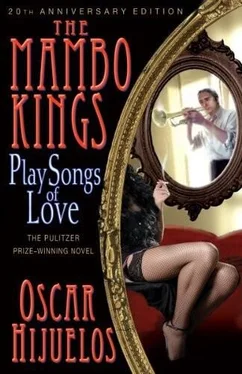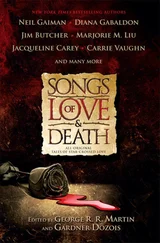Later he might go into the cavernous Park Palace rest rooms to get his fancy two-toned shoes shined, or to place a bet with one of the bookies who worked out of a long stall where magazines and newspapers, condoms, flowers, and reefers were sold. A dollar tip for the shoeshine boys, a piss in the urinal, a comb through his wavy hair, and then out again, his metal-heeled shoes tap, tap, tapping down the tiled halls, like shoes in the arcades of Cuba, toward the beautiful music. Then he’d dance or rejoin his quiet brother at their table, sipping drinks and gratefully observing the juicy babes around him. (Yeah, and even if he’s in the Hotel Splendour, it’s as if he’s back in that dance hall again, checking things out and noticing that there’s a nice brunette looking over at him. And who should come by when his date gets up to use the ladies’ room but that brunette, and even if she’s not a blonde, she looks seriously fly in a tight pink dress and bops toward him with a drink in her hand, and Dios mío, but she looks hot from dancing, with beads of sweat rolling off her chin and onto her breasts, her stomach damp and transparent through the clingy material of her dress. And what does she say but, “Aren’t you Cesar Castillo, the singer?” And he nods and takes hold of her wrist and says, “My, but you smell nice,” and he gets her name, cracks her up with a joke, and then, before his date returns, he says, “Why don’t you come back here tomorrow night and we can talk some more and have a little fun,” and he jumps ahead, feeling her nipple stiffen in his mouth, and then he’s back in the Park Palace, watching her walking off — he can just barely make out the outline of her panties through her dress, and she’s in bed tormenting him with the ball of her thumb, a rolling motion over his opening that makes the head of his penis the size of a Cortland apple, and then his girl’s sitting beside him and they have some more drinks, he remembered that.)*
The Mambo King flourished in that ballroom with its friendly crowds, good food, booze, companionship, and music. And when he wasn’t out to dance or to play jobs with his orchestra, he was visiting the friends he had made in the Park Palace and other dance halls, fellow Cubans or Puerto Ricans who would invite him over to their apartments to eat dinner, play cards, listen to records, and become a swaying ring of arms in the kitchen, singing and always having fun.
It was at the Park Palace that the Mambo King and his brother found many of their musicians. When he and his brother had first turned up in New York in early 1949, the beginning of the mambo boom, they had gotten jobs through their fat cousin Pablo, with whom they had at first lived, working in a meatpacking plant on 125th Street by day so that they could have enough money to party and set things up at night. They met a lot of people then, a lot of musicians like themselves, good players. There was Pito Pérez, who played the timbales; Benny Domingo on the congas; Ray Alcázar on the piano; Manny Domínguez, who played the guitar and the cencerro; Xavier from Puerto Rico, the trombone; Willie Carmen, the flute; Ramón “El Jamón ” Ortiz, the bass saxophone; José Otero, violin; Rafael Guillón, the rattle gourd; Benny Chacón, accordion; Johnny Bing, saxophone; Johnny Cruz, horn; Francisco Martínez, vibraphone; Johnny Reyes, the tres and the eight-stringed quatro. And, among them, the brothers themselves: Cesar, who sang, played the trumpet, guitar, accordion, and piano; and Nestor, flute, trumpet, guitar, and vocals.
Like the brothers, many of the musicians were workers by day, and when they played jobs and were on a stage, or went out dancing, they were Stars for a Night. Stars of buying drinks, stars of friendly introductions, stars of female conquest. Some of them were already famous like the Mambo King wanted to be. They met the drummer Mongo Santamaría, who had an act back then called the Black Cuban Diamonds; Pérez Prado,* the emperor of the Mambo; the singer Graciela; Chico O’Farrill; and that black fellow who liked Cubans so much, Dizzy Gillespie. And they met the great Macedonio Rivera, a dignified and dapper-looking mulatto, who would hang out at the bar of the Park Palace, his wife by his side, receiving his fans and their occasional gifts of jewelry, which he would calmly tuck into his jacket pocket. Later the jewelry would end up in a teakwood Chinese box that Rivera kept in his living room. Visiting at his apartment in the West Eighties, the brothers would see this box, thick with engraved watches, bracelets, and rings, its lid decorated with Chinese swirls and inlaid with the image of a mother-of-pearl dragon devouring a flower. And Cesar would say, “Don’t you worry, brother, that’s going to be happening to us one day.”
Cesar had a picture from one of those nights, tucked in the soft cloth pocket of his suitcase in the Hotel Splendour: the two brothers decked out in white suits and seated at a round table, the mirrored walls and columns behind them reflecting the distant lights, dancers, and the brass of an orchestra. Cesar, a little drunk and pleased to death with himself, a champagne glass in one hand and, in the other, the soft, curvaceous shoulder of an unidentified girl — Paulita? Roxanne? Xiomara? — looking a lot like Rita Hayworth, with her nice breasts pushed up into the top of her dress and a funny smile because Cesar had just leaned over and kissed her, licking her ear with his tongue, and Nestor beside them, a little detached and to the side, staring off, his brows raised slightly in bewilderment.
Those were the days when they’d formed the Mambo Kings. It started with jam sessions that used to drive their landlady, Mrs. Shannon, and their other neighbors, mostly Irish and German people, crazy. Musicians they knew from the dance halls would come over to the apartment with their instruments and set up in the living room, which was often noisy with wacky saxophones, violins, drums, and basses that screeched, floated, banged, and bounced out into the courtyard and street, so that the neighbors slammed down their windows and threatened the Cubans with hammers. The casual jam sessions became regular sessions, certain musicians always showed up, and so one day Cesar simply said, “Let’s make a little orchestra, huh?”
His best find, though, was a certain Miguel Montoya, a pianist and good professional who knew the secrets of arranging. He was also Cuban and had been kicking around in different orchestras in New York City since the early 1930s and he was well connected, having played with Antonio Arcana and with Noro Morales. They’d see Montoya over at the Park Palace. Dressed in white from head to toe, he wore large, glittering sapphire rings, and sported an ivory crystal-tipped cane. Rumor had it that although he’d show up in the dance halls with a woman he was effeminate in character. One night they went to Montoya’s apartment on Riverside Drive and 155th Street for dinner. Everything in his home was white and fleecy — from the goatskins and plumes that hung on the walls to the statues of Santa Barbara and the Holy Mother that he’d draped in silk, to the furry love seats, sofas, and chairs. In the corner his white baby grand piano, a Steinway, on which he’d placed a thin-necked vase filled with tulips. They dined on delicate slices of veal which Miguel had cooked with lemon, butter, garlic, salt, and olive oil; scalloped potatoes; and a grand salad, which they washed down with one bottle of wine after the other. Later, as the Hudson gleamed silver in the moonlight and New Jersey blinked in the distance, they laughed, turned on the record player, and passed half the night dancing rumbas, mambos, and tangos. Cultivating Miguel through flirtation, Cesar treated him with real affection like a beloved uncle, constantly patting and hugging him. Later in the evening he asked Montoya if he could spare the time to sit in with their orchestra, and that night Montoya gave in and said he would.
Читать дальше












